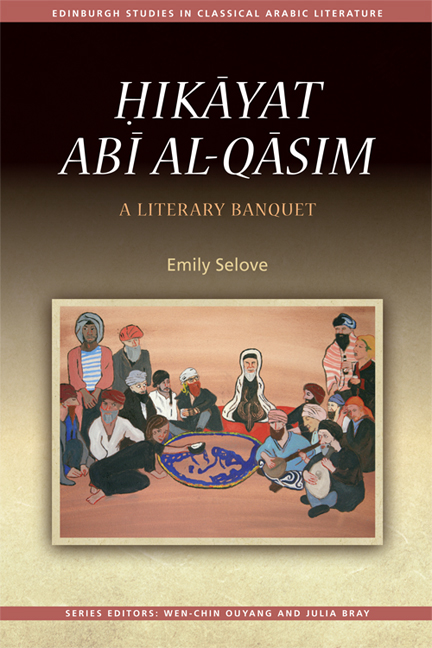3 - Crashing the Text
Published online by Cambridge University Press: 05 September 2016
Summary
Most statistical tables are parchingly dry in the reading, not so in the present case, however, where the reader is flooded with whole pipes, barrels, quarts, and gills of good gin and good cheer.
Melville, Moby-Dick, ‘The Decanter’Since the Ḥikāya takes place at a party, we might expect to experience some of the pleasures of this party while we read the narrative. As Abū al-Qāsim compares Baghdad to Isfahan, copiously listing foods and goods in a tirade that occupies a very bulky portion of the narrative, he seems to proceed in the order of events one would expect to experience if attending a feast. He begins with the overall atmosphere of the cities and their place-names, then describes their horses (on which, perhaps, we can imagine arriving at the party. He then describes clothing and houses (two of the first things we would notice upon arriving at a party). Some samples of these descriptions are found in Chapter 1.
Abū al-Qāsim concludes his description with wine, snacks, and entertainment, thus portraying, in his exhaustive and exhausting fashion, every luxury that could be presented at every stage of a party. He is by no means describing the party that he is attending in Isfahan; this party to which we are treated is a wholly hypothetical and encyclopedic feast of words. It feels highly specific, but, as stated in the previous chapter, only describes things not found in Isfahan. These are highly specific lists of things that do not, in the immediate context, exist.
Abū al-Qāsim's bombastic or grotesque poetry and prose stand in contrast both to his conversational exchanges with his half-stunned audience, as well as to the narrator's voice, which speaks rarely and simply. Thus the Ḥikāya weaves contrasting registers of Arabic literature into a continuous dinner conversation. The more literary and elaborate the language, the less it seems to have to do with reality. To take an example (cited in the Chapter 1), Abū al-Qāsim, having hinted (not so subtly) that he is hungry, is asked what he would like to eat. He replies with an acrobatic recitation of literary requests not only for food, but for gifts fit for the guest of a king: a swift charger, a choice singing girl, fine clothing, and so on.
- Type
- Chapter
- Information
- Hikayat Abi al-QasimA Literary Banquet, pp. 103 - 118Publisher: Edinburgh University PressPrint publication year: 2016

